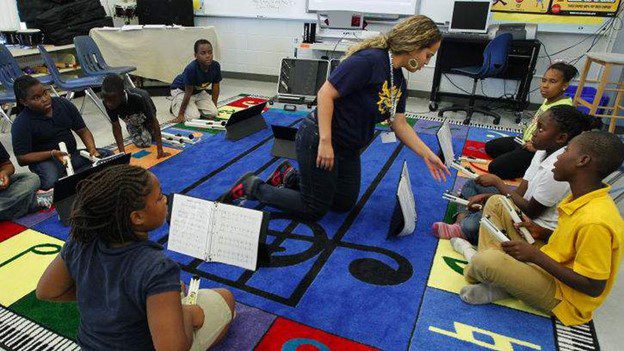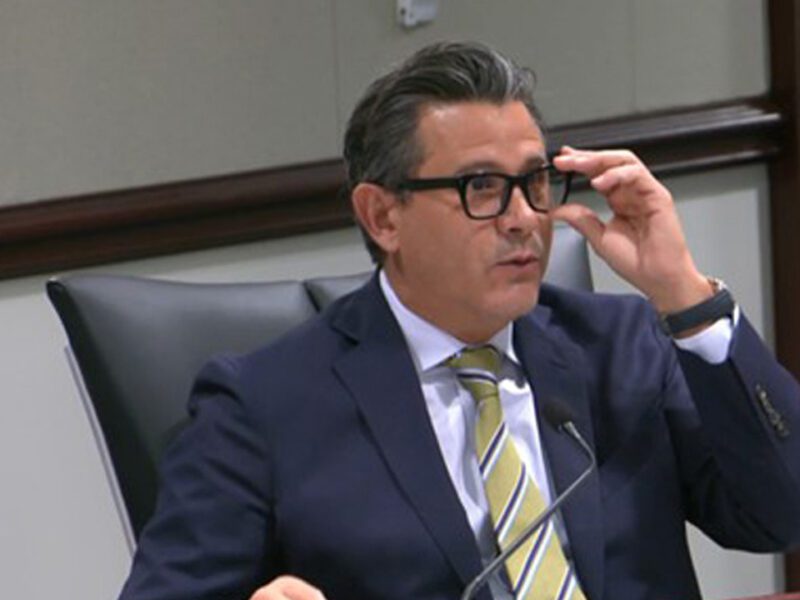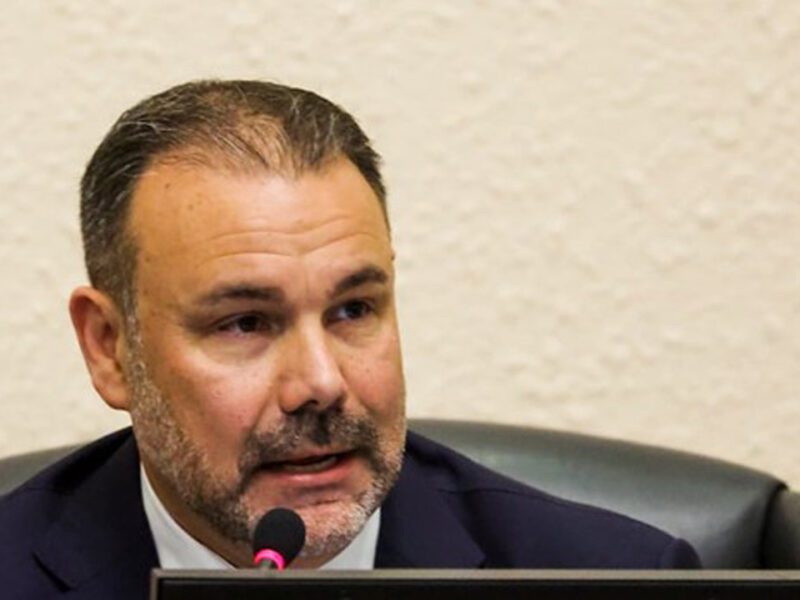
Some teachers move to Hillsborough charters after facing discipline elsewhere
They are vetted before being hired, but it’s unclear how thorough the process is.
Tampa Bay Times | By Marlene Sokol | October 19, 2022
Parents said Kimberly Gonzalez was upsetting their children by saying Eve was a man, Adam was gay and God was as real as Santa Claus.
Gonzalez denied making these statements. She kept her job teaching science at Progress Village Middle School in Tampa.
A year later, the concerns escalated. Children said they were told that the Holocaust basically did not happen, that Jewish people wanted World War II, and that the Auschwitz death camp was like a country club with soccer and a cinema. A parent received a link to an antisemitic conspiracy site through Gonzalez’s district messaging server.
Gonzalez told Hillsborough County school officials she wanted her students to think critically about what they learned in school. They opted not to renew her contract. After an argument about sick pay, in which she accused them of “enslaving” her, she left.
She soon found work at Bell Creek Academy, a charter school in Riverview.
Teachers at Florida charter schools, which are publicly funded but independently managed, must hold state credentials in most cases. But when they have a disciplinary history at the organizations they left, it’s unclear how extensively charter schools review them.
The Tampa Bay Times examined 14 such cases in Hillsborough County, often delving deeper into teachers’ backgrounds than the charters did when they hired them.
Five stemmed from enforcement actions against teachers who struggled to obtain credentials to meet the needs of non-native speakers of English. Caught by an algorithm, these teachers faced state action for plagiarism and a suspension of their teaching licenses.
Two of the other situations were publicized in the Times.
Lindsay Blanc was accused of duct-taping a kindergarten student’s eyes while at East Tampa’s Potter Elementary School in 2015. She denied the allegation during the district investigation but was suspended. A district report said she admitted to her principal that she sometimes used rolls of duct tape as a scare tactic when the children were misbehaving.
Later, in a settlement with the state licensing agency, Blanc agreed to undergo a psychological evaluation, seek treatment if necessary and take a college course in classroom management. The state Department of Education website shows her certification is intact.
Blanc could not be reached for comment. Since leaving the district, she has worked at charter schools including Excelsior Preparatory and Plato Academy Tampa.
Plato chief executive Matt Gunderson confirmed that Blanc works at the school and said Plato wouldn’t employ any teacher who was not good for students.
“As a general statement, all Plato Academy teachers are held to the highest of standards and expectations,” said Gunderson, also former principal of the Tampa school. “They are expected to follow the Florida Educators’ Code of Ethics and all state laws. More importantly, every Plato Academy teacher is 100% expected to honor the dignity and humanity of students that we serve in a way that honors the school’s mission of creating a nurturing learning environment.”
At Village of Excellence, another Tampa charter school, principal Glennis Perez also has known controversy in the district system.
![Glennis Perez [Hillsborough County Public Schools] Glennis Perez [Hillsborough County Public Schools]](https://www.tampabay.com/resizer//SEucOyV9M_kovcx4q6yMEfoi4is=/200x0/cloudfront-us-east-1.images.arcpublishing.com/tbt/NB6R3Z4SABAFZCA47QPPPL6IKA.jpg)
Perez resigned from the district in 2019 after a lengthy investigation into her conduct as principal of Spoto High in Riverview. Co-workers said she pushed them to submit false reports about students who withdrew, which would reduce the percentage who did not graduate, and pressured teachers to give students higher grades than they had earned.
Both actions would logically boost the school’s graduation rate at a time when the district was on a drive to raise that number to 90%. Employees described a strategy at Spoto that steered low-performing students into alternative schools, which would also improve the school’s statistics. They said Perez called this practice “selling the dream.”
She did not return calls seeking comment, nor did leaders at Village of Excellence.
Some of the teachers in the group of 14 showed brief lapses of judgment that got them into trouble. One lost his composure in 2015 while trying to supervise a special-needs student who did not want to take part in a class assignment. Another was accused of grabbing a student by the neck during a disagreement.
Teacher Michael Blamey had multiple allegations listed in his district file between 2005 and 2017. All of them were lies, he said in an interview.
He said he never left his classroom unsupervised to see a doctor, as the district alleged. He said he never looked at female middle school students inappropriately. Nor, he added, was he sports betting during school hours and on a school computer.
Blamey, who worked at Henderson Hammock Charter School after he left the district, said he was a good teacher for 32 years and one of his Hillsborough district principals was out to make his life miserable.
“I’m a good man,” he said. “When I lay down on the pillow at night, I’m good with God.”
Sometimes, teachers said, a reputation in the school system becomes part of the problem.
Robert Scott Parlett has multiple entries in his school district discipline file. The records also show he was assigned to 10 schools between 1999 and 2016. Today he works at Henderson Hammock.
“As a (physical education) teacher, you do wind up having to move a lot, early in your career,” Parlett said in an interview. This happens because of low seniority and limited positions in that teaching specialty, he said.
Parlett said the investigations in his district file did not amount to anything. He got into an argument with an adult in front of his students at DeSoto Elementary. At Kenly Elementary, he was accused of being too physical with children, and too strict when it came to breakfast and bathroom breaks. But, he said, “once you have too many allegations, the whole thing becomes a ‘where there’s smoke, there’s fire’ situation.”
He acknowledges he made an error in judgment at New Tampa’s Liberty Middle School. As a joke, when a sixth-grade student asked what they would do in gym class that day, Parlett said they would play “naked water polo.” New to the school, he said he was trying to establish a rapport with the students.
“It’s kind of like PE humor,” he said. But a complaint about the remark sparked allegations that he had made other jokes. A student said Parlett told them, “your moms are on the way to my house.” He denies ever saying that. But he resigned in 2016 and then worked for three charter schools: Learning Gate, Sports Leadership and Management (known as SLAM!), and Henderson Hammock.
Parlett said he has spent 23 years operating a side business as a swim coach with no controversies. Married with children, he said he has matured over the years. “I’ve gone through a lot in my life,” he said. “Everything’s a learning experience.”
Most of the charter school administrators who were contacted for this story declined to be quoted, but described a perfunctory process of vetting teacher candidates.
Typically, they said, they contact the candidate’s previous employer and check references. They make sure there is a valid state teaching certificate and a clean criminal record.
The Times went deeper, comparing charter schools’ employee lists against separate lists of teachers who had been the subject of district investigations. The employee lists and the investigative files were obtained through a public records requests.
In the case of Kimberly Gonzalez, who was accused of making offensive remarks about the Holocaust, charter schools advocate Lynn Norman-Teck laid out this sequence of events:
“The school followed all employee screening protocols as required by state law — which included passing a background check conducted by the school district. There was no discipline against the teacher’s educator license. The teacher was cleared by the school district for employment and eligible to work as a teacher in the State of Florida.”
Norman-Teck issued the statement after the Times contacted Bell Creek, the charter school, which designated her as their spokesperson. Gonzalez declined to comment.
Like several other teachers among the 14, Gonzalez reapplied to the district a few years after administrators there decided not to renew her contract.
A letter in her district file included this sentence: “There is a possibility you may be eligible to reapply for an instructional position in the district in the 2021-22 school year, with the condition you provide three years of effective teaching evaluations from another public or private school district, or charter school.”
In their interviews with the Times, the charter administrators described a collaborative relationship with the district that sometimes results in teachers entering the charter sector for awhile and using that time to refine their skills.
James Griffin, who served as principal at both Henderson Hammock and SLAM, was listed as a reference for Parlett when he re-applied to the district.
Griffin, now retired, described Parlett as a rule-follower who “can come off like a Marine Corps drill instructor.” That demeanor sometimes alienated students and staff.
But Griffin said Parlett went out of his way to help students and the school. “He’s kind of that silent support person,” Griffin said. “He would do anything you asked him to do.”
He agreed that Parlett improved with maturity. “I’ve seen him grow just over the years I knew him,” he said.
“As a principal, even when working in public schools, I think sometimes charters become great training grounds,” Griffin said.
Often, he added, a young teacher will stay at a charter school for two or three years before switching to the district system.
Griffin said he believes in giving people second chances “because we do mature, our goals change, our lifestyles’ change and you’ve got to be open to growth.”





